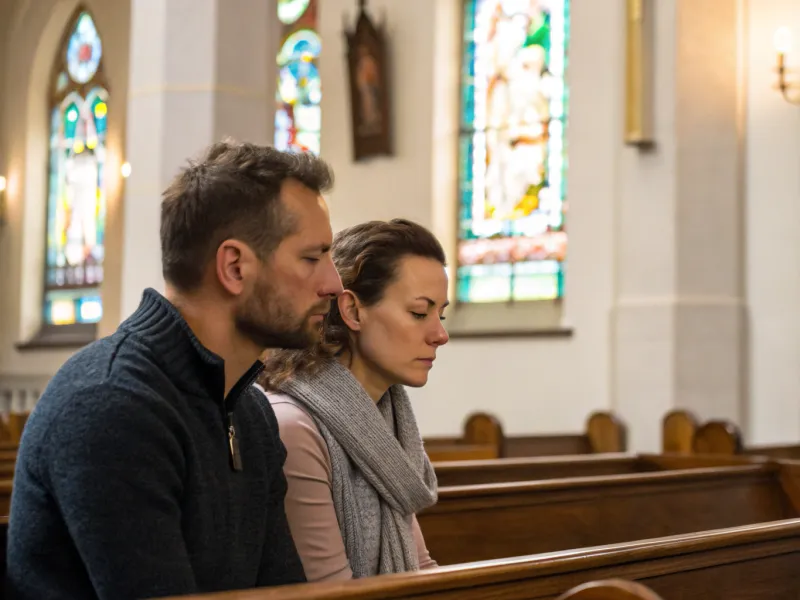32 Common Reasons Couples Stay In Unhappy Marriages (Even When They Know It’s Over)
Marriage, a sacred bond meant to unite two souls, often turns into a silent battlefield where unhappiness reigns. You might find yourself standing in the midst of it, feeling trapped and yet unable to break free.
It’s not just the vows or society’s expectations that keep you there—it’s a complex web of emotions, fears, and practical considerations that make the escape seem almost impossible.
Here is a list of 32 common reasons couples stay together even when they’re not happy.
1. Medo da solidão

O peso da solidão pode ser avassalador, surgindo quando menos se espera. Sussurra que estar sozinho é muito pior do que suportar uma relação insatisfatória. A ideia de regressar a uma casa vazia, onde o silêncio ecoa nos espaços vazios, pode ser inquietante. Este medo convence muitos a ficar, acreditando que qualquer companhia é preferível ao vazio.
Yet, solitude isn’t always the enemy. Beyond initial discomfort, it can create room for self-discovery and renewal. Enfrentar este medo pode ser transformadorrevelando que a solidão e estar sozinho não são a mesma coisa. Reformular a solidão como uma oportunidade e não como um castigo pode ser a chave para recuperar a felicidade.
2. Dependência financeira

O dinheiro está ligado a todos os aspectos da vida e a dependência financeira pode tornar-se uma barreira invisível à mudança. Despesas partilhadas, contas conjuntas e obrigações financeiras podem fazer com que a separação pareça impossível. O fardo de manter a estabilidade ultrapassa muitas vezes o desejo de satisfação emocional.
However, financial independence is not an unattainable dream. Exploring new income sources, furthering education, or seeking financial advice can be empowering. Understanding available options and making informed decisions can clear the haze of uncertainty. Emotional well-being shouldn’t be sacrificed for monetary security—finding a balance is essential.
3. Culpa e responsabilidade

A culpa tem uma forma de se enredar nas relações, tornando difícil afastar-se. A pressão para manter a imagem de uma família feliz pode pesar muito, especialmente quando as memórias de momentos partilhados parecem exigir lealdade. Pode parecer que libertar-se equivale a desiludir toda a gente.
Mas a verdadeira responsabilidade vai para além da preservação das aparências. Prioritizing personal well-being isn’t selfish—it’s necessary. Viver num tumulto emocional por causa dos outros pode não ser a melhor solução. Libertar o peso da culpa pode abrir a porta a uma existência mais gratificante, oferecendo clareza e uma nova perspetiva sobre o verdadeiro significado da felicidade.
4. Medo da mudança

The unknown has a way of making the present feel safer, even when it’s far from fulfilling. A stagnant but familiar life can seem preferable to a future filled with uncertainty. The prospect of starting over can be paralyzing, keeping individuals tethered to unhappy relationships.
Yet, change is not inherently destructive—it often leads to growth and renewal. Uncertainty may feel intimidating, but it also holds the potential for happiness and self-discovery. Taking the first step requires courage, but the possibility of a more fulfilling life makes it worth considering.
5. Pressão e expectativas da família

As famílias moldam os valores, as decisões e as crenças, influenciando frequentemente as principais opções de vida. As expectativas colocadas pelos entes queridos podem criar uma obrigação invisível de manter um casamento, mesmo quando a felicidade pessoal está em causa. A desaprovação, o julgamento ou o medo de desiludir os outros podem fazer com que a separação pareça impensável.
Yet, prioritizing personal fulfillment is essential. Living according to someone else’s vision of happiness can lead to long-term resentment. Finding a way to communicate personal needs while respecting family ties can be challenging, but ultimately, making choices that align with true desires can lead to a more authentic life.
6. Children’s Well-being

Parents often stay in unhappy marriages believing it’s best for their children. The fear of disrupting their world, creating instability, or exposing them to the pain of separation can be a powerful motivator to remain together. The desire to shield them from emotional distress takes precedence over personal happiness.
No entanto, as crianças são muito perspicazes. Conseguem sentir tensões, conflitos e a ausência de amor entre os pais. Um lar repleto de infelicidade não resolvida pode não ser o ambiente de criação que se pretende para elas. Vale a pena refletir profundamente sobre a possibilidade de um lar pacífico e separado proporcionar um exemplo mais saudável de amor e de relações.
7. Esperança de mudança

Agarrar-se à crença de que as coisas vão melhorar pode manter as pessoas ancoradas em relações que não as satisfazem. A esperança de que o amor se reacenda, que as circunstâncias se alterem ou que o parceiro mude pode ser uma razão convincente para ficar. A possibilidade de renovação, alimentada por memórias de tempos melhores, torna difícil deixar ir.
However, hope should be based on reality, not wishful thinking. Evaluating whether genuine progress is being made—or if it’s just an illusion—can be eye-opening. Clarity comes from recognizing whether change is truly occurring or if it’s merely an excuse to avoid making a difficult decision.
8. Medo do julgamento

Society often places immense pressure on maintaining the facade of a successful marriage. The fear of what others will say—the gossip, the unsolicited opinions, the sideways glances—can be paralyzing. The weight of perceived failure looms large, making it difficult to prioritize personal happiness.
But external judgments shouldn’t dictate life choices. The opinions of others are fleeting, while personal fulfillment is long-lasting. Recognizing that self-worth isn’t tied to external validation can be liberating. Choosing happiness over societal expectations is a powerful act of self-respect.
9. Falta de autoestima

Self-doubt has a way of convincing individuals that they don’t deserve better. When confidence erodes, it becomes easy to settle, believing that an unfulfilling marriage is the best they can hope for. The fear of never finding happiness elsewhere keeps them bound to a situation that doesn’t serve them.
But self-worth isn’t defined by relationship status. Recognizing intrinsic value, independent of a partner’s validation, is crucial. Embracing the belief that happiness is deserved—not earned—can be a transformative step toward reclaiming a life of fulfillment and self-respect.
10. Apego emocional

O passado tem um poder imenso. Experiências partilhadas, marcos históricos e memórias queridas criam laços emocionais profundos que são difíceis de cortar. Mesmo quando o amor se desvanece, o apego ao que foi outrora pode fazer com que deixar para trás pareça impossível. A ideia de desmantelar anos de ligação é de partir o coração.
Yet, nostalgia shouldn’t cloud reality. Honoring the past doesn’t mean clinging to an unfulfilling present. Distinguishing between attachment and genuine happiness is essential. Sometimes, choosing to move forward is the best way to respect the love that once existed while creating space for a new chapter to begin.
11. Crenças religiosas ou culturais

A fé e as tradições culturais influenciam profundamente as escolhas pessoais, reforçando frequentemente a santidade do casamento. Pode dar por si imerso numa comunidade onde a separação é mal vista, onde os votos não são apenas palavras, mas compromissos sagrados. A ideia de ir contra estes valores pode parecer um peso insuportável, tornando difícil considerar um caminho diferente.
Instead of viewing your beliefs as constraints, consider whether they also offer guidance toward fulfillment and well-being. Spiritual and cultural teachings often emphasize love, respect, and personal growth—values that should extend to yourself as well. Seeking counsel from trusted leaders or reflecting on personal interpretations may provide clarity. There’s a way to honor both tradition and individual happiness without feeling like one must be sacrificed for the other.
12. Medo de conflitos

Para muitos, o confronto é uma perspetiva esgotante, levando-os a escolher o silêncio em vez de falar. A tensão aumenta, as questões não resolvidas acumulam-se e evitar discussões torna-se a norma. Ao sentar-se à mesa de jantar, trocando apenas as palavras mais necessárias, pode dizer a si próprio que é melhor manter a paz do que criar problemas.
Yet, unspoken frustrations don’t simply disappear. They manifest in resentment, emotional withdrawal, and a growing distance between partners. Rather than medo de conversas difíceis, consider them an opportunity for honesty and progress. Learning to communicate openly—even if it feels uncomfortable—can pave the way for deeper understanding or a decision that leads to long-term contentment.
13. Baixa autoestima

A negative self-image can convince you that you’re undeserving of happiness, that a dissatisfying relationship is the best you can hope for. Doubts creep in, making it easy to settle rather than seek something better. When self-worth is low, the idea of leaving can feel impossible, as if no alternative exists.
This mindset, however, does not define reality. Building confidence takes time, but it begins with recognizing your inherent value. Taking small steps to cultivate self-acceptance—whether through personal achievements, therapy, or self-care—can shift your perspective. The more you believe in your worth, the clearer it becomes that staying in an unfulfilling marriage is not the only option.
14. Medo de começar de novo

The prospect of beginning again can feel daunting. The idea of rebuilding a home, forming new routines, and facing an uncertain future may seem overwhelming. The stability of the present—no matter how unfulfilling—can feel safer than stepping into the unknown.
No entanto, cada novo começo contém o potencial para a descoberta. A vida para além de um casamento estagnado pode trazer novas experiências, alegrias inesperadas e um sentido de renovação. Uma mudança de perspetiva pode fazer toda a diferença; em vez de ver a mudança como um fim, considere-a como uma porta para uma vida que se alinhe mais com as suas necessidades e aspirações.
15. Entorpecimento emocional

When emotions fade, they don’t always disappear—they often retreat beneath the surface, leaving a dull emptiness in their place. You may catch yourself fazer o que é preciso, sentir-se desligadoA ausência de sentimentos fortes pode ser tão alarmante como os conflitos constantes. A ausência de sentimentos fortes pode ser tão alarmante como um conflito constante.
This numbness can serve as a signal rather than a conclusion. Taking the time to reconnect with yourself, examining what brings you joy or fulfillment, may illuminate whether the relationship has room for revival or if it’s time to move on. Acknowledging this emotional state is the first step toward making a change, whether that means rekindling what was lost or seeking something new.
16. Dependência do parceiro

Depender de um parceiro para apoio emocional ou prático pode criar uma sensação de aprisionamento. Quando todos os aspectos da vida estão interligados, imaginar a independência pode parecer impossível. A ideia de estar sozinho, de tomar decisões sem o seu contributo, pode ser enervante.
Cultivating independence doesn’t mean abandoning connection—it means fostering a sense of self outside the relationship. Exploring personal interests, developing skills, or strengthening external support networks can provide the confidence needed to make empowered choices. Finding balance between reliance and self-sufficiency can lead to greater emotional resilience, regardless of the relationship’s outcome.
17. Medo do arrependimento

A preocupação de que uma decisão possa mais tarde parecer um erro pode ser paralisante. As memórias de dias melhores vêm à tona, tornando tentador ficar na esperança de que esses momentos possam voltar. O medo de olhar para trás e perguntar-se: "E se eu tivesse tentado mais?" pode sobrepor-se ao reconhecimento de que a mudança é necessária.
Instead of viewing regret as an inevitable consequence, consider it a tool for self-reflection. A thoughtful, honest evaluation of the present—not just nostalgia for the past—can provide clarity. Making a choice that prioritizes genuine happiness minimizes the likelihood of future remorse.
18. Falta de sistema de apoio

Going through life’s challenges without a strong support network can feel isolating. When friends or family aren’t available for guidance, the idea of leaving an unhappy marriage may seem unrealistic. The thought of facing the transition alone can be more frightening than enduring a dissatisfying relationship.
Yet, support can be found in unexpected places. Whether through online communities, professional counseling, or forming new friendships, it’s possible to build connections that provide strength and encouragement. No one should have to navigate life’s biggest decisions in solitude—seeking support, even in small ways, can make all the difference.
19. Medo de magoar o parceiro

Caring for someone doesn’t always mean staying, yet the thought of causing pain to a spouse can be overwhelming. You may worry about their emotional well-being, the impact on their self-esteem, or how they’ll cope with the end of the relationship. It can feel as though leaving is an act of cruelty.
However, staying in a marriage out of pity or obligation is not a true act of kindness. Genuine compassion includes honesty, even when it’s difficult. Addressing the situation with sensitivity and respect allows both partners the opportunity to seek happiness, rather than remaining in a dynamic that doesn’t serve either person fully.
20. Conforto na rotina

Os hábitos diários e o ambiente familiar criam uma sensação de estabilidade, fazendo com que a mudança pareça desnecessária. Mesmo que a relação não tenha paixão ou satisfação, o conforto da rotina pode ser tranquilizador. Acordar na mesma casa, seguir horários previsíveis e saber o que esperar pode parecer preferível à incerteza de um novo capítulo.
No entanto, a rotina não deve ser confundida com contentamento. Se a familiaridade é a única coisa que mantém uma relação intacta, talvez seja altura de reconsiderar se esse conforto vale a pena sacrificar a felicidade a longo prazo. Sair da rotina pode parecer perturbador no início, mas muitas vezes leva ao crescimento pessoal e a uma realização renovada.
21. História partilhada

Memories have a way of making a relationship feel irreplaceable. The moments spent together, the laughter, the milestones—they create a sense of attachment that feels impossible to sever. Looking through old photos or recalling special occasions, you might feel a deep connection to the life you’ve built, making the thought of walking away even harder.
Holding onto the past, though, can sometimes cloud the reality of the present. While shared experiences form a bond, they don’t always reflect the current state of the relationship. Evaluating whether those memories are enough to sustain long-term happiness can bring clarity. Honoring the past doesn’t have to mean staying in a situation that no longer serves you.
22. Medo do fracasso

Ending a marriage can feel like admitting defeat. You may have envisioned a lifelong commitment, believing love would always be enough to weather any storm. Facing the possibility that things didn’t turn out as planned can be overwhelming, leading to self-doubt and feelings of inadequacy.
Failure, however, is not defined by the end of a relationship. It can also mean staying in an unhappy situation out of fear. Growth comes from recognizing when a chapter has run its course and having the strength to turn the page. Acknowledging that some things aren’t meant to last forever can be liberating, paving the way for new beginnings.
23. Falta de comunicação

A base de uma relação forte assenta num diálogo aberto e honesto. Quando a comunicação se desvanece, os mal-entendidos enraízam-se, criando uma distância crescente entre os parceiros. Sentados na mesma sala, mas sentindo mundos à parte, podem descobrir que o silêncio fala mais alto do que as palavras.
Estabelecer contactos através de conversas significativas pode ser um ponto de viragem, mas exige esforço de ambas as partes. Se as discussões forem forçadas ou conduzirem constantemente à frustração, isso pode indicar problemas mais profundos que precisam de ser resolvidos. Reconhecer quando a comunicação foi completamente interrompida pode ser o primeiro passo para decidir o que vem a seguir.
24. Dependência de activos partilhados

Os problemas financeiros podem complicar a decisão de se separar. As contas conjuntas, os bens e os investimentos criam camadas de obrigações que fazem com que a separação pareça assustadora. A logística da divisão de uma vida construída em conjunto pode parecer esmagadora, levando muitos a permanecer em casamentos que já não trazem satisfação.
Understanding that financial security doesn’t have to come at the cost of emotional well-being is crucial. Seeking guidance from financial advisors or legal professionals can help clarify options and create a strategy for independence. Navigating these practical matters may seem challenging, but finding stability outside of an unhappy marriage is entirely possible.
25. Exaustão emocional

Gerir constantemente uma relação que está a falhar pode esgotar toda a energia. O peso das frustrações não ditasA vida de cada um de nós, os compromissos intermináveis e a tensão emocional podem fazer com que nos sintamos entorpecidos. Dia após dia, a exaustão acumula-se, fazendo com que até a ideia de mudança pareça demasiado difícil de enfrentar.
Reconhecer o preço a pagar por um casamento infeliz é um passo importante para a cura. Por vezes, a exaustão não advém do facto de se ir embora, mas do esforço de se aguentar. Dedicar algum tempo para avaliar o bem-estar pessoal e dar prioridade à saúde mental e emocional pode ser a chave para recuperar a paz e a felicidade.
26. Incapacidade de imaginar um futuro sozinho

Visualizing life without a long-time partner can be unsettling. The habits, the routines, the sense of companionship—even if unfulfilling—offer familiarity that is difficult to let go of. A future without that stability can seem uncertain and intimidating.
Rather than focusing on what will be lost, shifting attention to new possibilities can be empowering. A life built on personal fulfillment, growth, and self-discovery can bring unexpected joy. Exploring new hobbies, social circles, and opportunities can ease the transition, transforming fear into excitement for what’s ahead.
27. Negação de problemas

Pretending everything is fine can be easier than facing difficult truths. Ignoring signs of unhappiness, brushing aside concerns, and maintaining a façade of normalcy may provide temporary comfort. The idea of confronting reality, however, can feel like opening a floodgate of emotions that may be hard to contain.
Avoidance only delays the inevitable. Acknowledging dissatisfaction and recognizing the cracks in the relationship can be the catalyst for necessary change. Honest self-reflection can illuminate whether the marriage is salvageable or if parting ways is the best path forward. Facing the truth is never easy, but it’s often the first step toward a more fulfilling life.
28. Medo de ficar sozinho para sempre

A ideia da solidão pode ser assustadora, especialmente depois de anos a partilhar a vida com outra pessoa. Perguntas sobre se o amor será encontrado novamente, se o companheirismo ainda é possível ou se a felicidade pode existir fora do casamento podem criar uma profunda ansiedade. Ficar pode parecer a única forma de evitar essa incerteza.
Embracing independence, however, can lead to unexpected discoveries. Being alone does not mean being lonely—it can be a time of growth, new connections, and personal fulfillment. Allowing space for new experiences can bring a sense of liberation, proving that a meaningful and joyful life exists beyond the confines of a relationship.
29. Romanticizing the Past

It’s easy to get lost in the golden glow of “what used to be.” You remember the early days—the laughter, the connection, the shared dreams—and convince yourself that maybe things aren’t so bad now. That nostalgia becomes a shield, protecting you from facing the present truth.
But clinging to memories doesn’t change reality. Love that once felt vibrant can fade, no matter how strong it once was. Staying for the past means ignoring who you’ve become in the present—and what you still deserve in the future. Honoring your history doesn’t require you to remain in a place where your happiness no longer lives.
30. Fear of Disrupting Stability

Even when the relationship feels stagnant or cold, the life you’ve built together may feel too intertwined to unravel. The shared home, the routines, the social circles—they all represent a fragile balance you’re afraid to shake. The idea of disrupting it all feels overwhelming.
But stability without joy is a quiet kind of suffering. Comfort shouldn’t come at the cost of inner peace. True stability is built on authenticity and mutual fulfillment—not on silent endurance. Choosing to disrupt the familiar can be the bravest step toward a life that feels whole again.
31. Social Status Concerns

In a world where appearances often speak louder than words, some couples remain together to preserve their social status. Attending events as a couple can maintain an image of unity and success.
For many, the fear of losing social connections and acceptance outweighs the desire for personal happiness.
This can lead to a facade of contentment, masking the underlying dissatisfaction. The pressure to conform to societal expectations can be overwhelming, making it difficult for individuals to break free from an unhappy marriage.
The fear of judgment and the loss of prestige can trap couples in a cycle of discontent.
32. Shared Business Interests

When a couple shares business interests, their personal lives become entangled with their professional endeavors. This integration creates a complex situation where separating might mean risking financial stability and professional success.
The fear of jeopardizing a thriving business can overshadow personal unhappiness.
For some, maintaining a partnership in both love and business can be challenging, but the idea of starting over professionally is daunting.
The interdependency of their roles might compel them to stay together, prioritizing economic security over emotional fulfillment.







